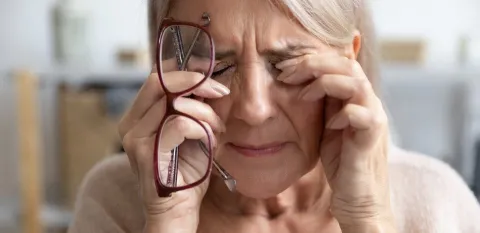Are Dry Eyes a Symptom of Menopause?

Most of us are familiar with the common symptoms of menopause like hot flashes, night sweats, insomnia, and even depression, but did you know that eye irritation and dry eyes can also be added to that list?
Our eyes have a tear film (made of water, oil and mucous) that covers and lubricates them. Dry eyes occur when we don’t produce enough tears or when our tears are ineffective, causing irritation. It may surprise you to learn that your body’s reproductive hormones influence the production of the tear film. As the levels of your hormones change, so might the protective layer of moisture.
Symptoms of Dry Eye
Do you have any of these symptoms?
- Burning
- Itching
- Redness
- A gritty feeling
- Excessive tearing
- The sensation of something in your eye
- Blurred vision
How to Relieve Irritation
There are a number of ways to relieve this uncomfortable and annoying condition.
- Over-the-counter medications (artificial tears) can provide additional lubrication to your eyes.
- If your symptoms are severe, your doctor may prescribe a medication suitable for your condition.
- Anti-inflammatory medications like topical cyclosporine A (Restasis) and lifitegrast (Xiidra) may help reduce inflammation.
- Steroid eye drops can temporarily relieve dry eye symptoms but must be prescribed and used under supervision of an eye care professional as there may e side effects associated with long-term use.
- An eye drop called Miebo can improve the function of glands in the eyelid that promote quality of tears.
- A nasal spray called Tyrvaya can be used twice a day to stimulate more and better tear production.
- Small tear duct plugs implanted by an ophthalmologist or optometrist (doctors specializing in the eye) can conserve tear volume.
- Upping the level of omega-3 fatty acids in your diet can also be effective as they appear to improve the function of the glands in the eyelid that produce the oily part of tears.
- Applying warm compresses and gently massaging your eyelids improve tear quality.
How to Avoid Dry Eye
You can also take steps to prevent dry eye by being a little kinder to your peepers.
- Cut down on screen time: If you work at a computer all day, be sure to take frequent breaks. Try closing your eyes for a few minutes or blinking repeatedly for a few seconds.
- Protect your eyes: Wrap-around sunglasses help block wind and air that can dry your protective tear coating.
- Avoid triggers: Smoke and pollen can irritate your eyes making your symptoms more severe.
- Use a humidifier: Adding moisture to the air in your home or office may help.
- Don't use contact lenses: Contact lenses can make dry eyes worse. Consider switching to glasses or talk to your doctor about specially designed contact lenses.
- Thoroughly remove eye makeup: Eyeliner, shadow and mascara can get into your eyes while you sleep, causing irritation. Be sure to completely remove all traces of eye makeup with a gentle cleanser before bedtime.
- Maintain an eyelid hygiene regimen: Apply a warm compress 10 minutes in the morning and evening, gently massaging your eyelids. Clean the lid margins and lashes with over-the-counter eyelid wipes daily to help reduce inflammation of the eyelids.
- Artificial tears are like lotion for the eyes. Lubricate!
Untreated Dry Eyes Can Lead to Complications
If you’re experiencing dry eye, whether or not it is associated with menopause, talk to your primary care physician or ophthalmologist. While the condition may seem like a minor annoyance to you, untreated chronic dry eye can lead to more serious complications like a corneal ulcer, conjunctivitis, headaches, difficulty keeping your eyes open and even depression. The right treatment and a few preventive measures can improve your comfort and quality of life.
Related Posts
Eye Love: Caring for your Aging Eyes Think you might have dry eye? Let us work with you to find the best course of treatment for you. Schedule your eye health appointment today by calling 855-UMASS-MD (855-862-7763).
Guest Blogger: Juan Ding, OD, optometrist at UMass Memorial Eye Center
Note: The content of this blog is for informational purposes only. It is not intended for use as diagnosis or treatment of a health problem or as a substitute for the professional consultation of a physician or qualified health care provider. If you have specific questions or concerns regarding a health or medical condition, contact your physician or a licensed health care professional.

